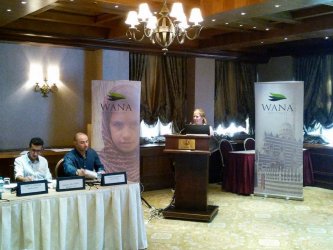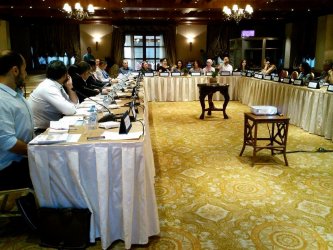-
Upscaling Sustainable Energy for Community Buildings in ...
Upscaling Sustainable Energy for Community Buildings in Refugee-Hosting Areas
On 28 September, the WANA Institute, Chatham House, EDAMA, and the Norwegian Refugee Council (NRC) brought together 30 experts in Amman to discuss how to upscale sustainable energy investments in community buildings in Jordan.
In order to meet the increased energy demands arising from the presence of Syrian refugees in host communities, energy efficiency and renewable energy measures must be accelerated in buildings across Jordan. This is highlighted in the Jordan Response Plan for the Syria Crisis, a three-year vision led by the Ministry of Planning and International Cooperation to ensure the integration of humanitarian aid and long-term national resilience.
The experts of the Energy & Water Working Group of the Moving Energy Initiative discussed how to increase investment in efficiency retrofitting and solar energy for community buildings such as schools, hospitals and houses of worship in Jordan and Lebanon. These measures will simultaneously help Jordan reach its goal of having 10% of its primary energy supply be renewable in 2020, combined with a 20% reduction in energy consumption.
The meeting identified the main challenges, such as how to coordinate with local and national authorities, gain owner and user engagement and support, secure financing opportunities, deploy financial savings on electricity and water effectively, build the capacity of refugees and host communities, and replicate successful cases nationally.
“Today we heard about the tens of thousands of JODs in energy and water bill savings that are possible for a school or a hospital each year. The question is how these savings can be reinvested to generate more benefits for local communities,” said Glada Lahn of Chatham House.
The participants also reviewed trends in refugee employment across Jordan: “It is valuable to explore ideas for training Syrian refugees to work in sustainable energy projects,” Dorsey Lockhart, WANA Institute, said.


